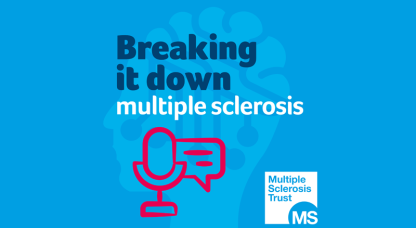Tingling, burning, numbness, pins and needles, stabbing, crawling – sound familiar? These strange sensory symptoms are known as altered sensations, a common type of nerve pain in MS. Here we chat to pain specialist, Dr Amanda Howarth, to understand why these sensations happen, how they can be treated and the steps you can take to reduce their impact on your daily life.
Ask the expert: tingling, burning and numb sensations
10 November 2023

What are altered sensations and why do they happen in MS?
Amanda says: Altered sensations are feelings that people have in various parts of their body – often in their legs, feet, hands and arms. They can feel like stabbing, shooting and tingling pains. Sometimes it may feel like pins and needles or a tickle. These sensations can be sharp, dull, constant, or they can come and go. Some people describe them as painful; others describe them as a sensation.
These sensations are a type of nerve pain (also known as neuropathic pain). They’re caused by damage to the nerves (demyelination). The myelin sheath is there as a protective barrier around the nerves. When it's damaged, the nerves in the brain and spinal cord become exposed and messages can’t travel along the nerves as smoothly. Messages can be interrupted and may not be interpreted correctly by the brain.
So, if you have strange sensations in your feet, you might assume there is damage in your feet. But actually, there is nothing wrong with your feet. Instead, it’s the nerves in your brain and/or spine that supply messages to and from your feet that are damaged.
What treatments are there for altered sensations?
Amanda says: We can't fix the demyelination that causes the sensations unfortunately, but there are different options for managing nerve pain. We can split those into two categories: medication and non-drug treatments.
The medication we prescribe for nerve pain is usually drugs that have been manufactured for other purposes. This includes anticonvulsant drugs, which are used for epilepsy, and antidepressants, which are usually used to treat long-term depression. Routine painkillers, like paracetamol or ibuprofen, tend not to be effective for treating nerve pain.
Anticonvulsants and antidepressants are quite effective at treating altered sensations. But alongside the benefits, they do have some side effects that people may find tricky to manage, such as drowsiness. We can usually get around this by starting people off on a lower dose and gradually building up. This can help people become more tolerant of the side effects over time.
Non-drug treatments for altered sensations can be very useful and often require simple changes in behaviour.
Identifying what triggers and aggravates your altered sensations is a useful first step. You can then work to remove or reduce those triggers. Triggers may include:
- excessive heat or cold
- poor posture and positioning
- coughs, colds and viruses
- other MS symptoms, such as fatigue.
A diary is a good starting point. Sometimes it isn't until people start keeping track of their pain that they can identify a pattern.
Some people find complementary therapies useful. These should be used with the support of your GP, MS nurse or neurologist. Gentle exercises – such as stretching, yoga and Pilates – can be beneficial. From my clinical experience, massage, aromatherapy and acupuncture can be useful for managing lots of different types of pain and altered sensations in MS. There's limited evidence around this quite simply because the research hasn't been done. But anecdotally, I've come across a lot of people who’ve found those complementary therapies helpful.
Sometimes when we're looking at managing nerve pain, we can’t get rid of the pain completely. However, we can change how people manage and cope with it by improving other areas. If we can improve somebody's sleep, for example, they generally cope with things so much better. Working on these other areas improves people's ability to manage pain on a day-to-day basis.
Other techniques that help with pain include relaxation and distraction, as well as pacing, planning and prioritising tasks.
What health professionals are involved in pain management?
Amanda says: If you’re not yet diagnosed with MS, the first person to speak to would be your GP. If you have an MS team, your MS nurse and neurologist will be able to help. GPs, neurologists and sometimes MS nurses can prescribe medication for nerve pain.
Physiotherapists may be involved in pain management too. They will be thinking about things like gentle exercises and stretches that can help; and monitoring how different movements and activities might be aggravating those altered sensations. A physiotherapist may involve an occupational therapist if aids and equipment to improve posture and positioning may be beneficial.
If your MS team has tried to help with pain management but you’re not seeing much improvement, then people can be referred on to a pain service.
Any tips for managing burning pain in my finger that lasts for 15 minutes at a time?
Amanda says: If the burning sensation lasts for 15 minutes, medication is probably not going to be able to kick in and work in that time. If it's happening very regularly for 15 minutes at a time, medication could be an option. If it's infrequent, and those 15 minutes happen but not that often, you could look at applying a hot or cold compress. This will vary according to what is aggravating the pain. If heat is aggravating the pain, applying a cold compress to the area may help, and vice versa.
Mobility of our hands is something that is often neglected. Hand and finger exercises, not necessarily when you’re experiencing pain, could possibly help with something like this. A physiotherapist could provide a series of simple hand, finger and wrist exercises that could be done. This may reduce the frequency or intensity of the episodes.
My torso went numb while getting dressed. How long will this last? Why does it feel so strange?
Amanda says: There’s a sensation called the MS hug that’s common for people with MS. People describe it as a tightness or numbness. People say it can feel like they can’t expand their chest properly. What you describe could be the MS hug.
Unfortunately, there's no way of knowing how long those feelings will last because it varies from person to person. But what we do know, is that it often goes away on its own.
The numbness can be a result of the nerve damage that we've already talked about. But sometimes people experience a tightness around their chest due to muscle spasms. If this is the case, then medication is something that can be considered.
Your healthcare professional will need to work out whether the sensation is due to muscle spasms or nerve pain. The medication that we would use for each of those is different.
Will the constant tingling in my leg ever go away?
Amanda says: It’s very difficult to say, unfortunately, as it varies from person to person. It’s common for people to have the sensations there all the time, but they usually vary in severity day to day. The changing severity may be linked to other factors. For example, are you distracted? Are you in a position that’s making it better or worse? Are you in a particularly warm or cold environment?
The key to managing and living with ongoing nerve pain is identifying what those triggers are and recognising patterns. Then you can address the triggers and start to make changes.
Dr Amanda Howarth is a senior lecturer in the Department of Nursing at Sheffield Hallam University. She has a clinical background in pain management, specifically in people with multiple sclerosis.
Latest news & stories
Sign up to updates from us
Keep up-to-date with the latest MS news, explore new research, read the stories of people living with MS, find out practical tips from MS experts, and discover exciting fundraising opportunities
If you would like to sign up for post or telephone (SMS) updates you can complete our sign up form here





